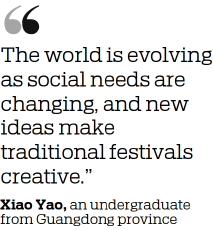January 19, 2022
SHANGHAI – These days, celebrating the most traditional holiday in China, Spring Festival, requires more than family reunion dinners, visiting relatives and watching festive television programs, as the younger generation is elevating the family get-together with new ideas.
With decorations to be hung, seasonal recipes to be cooked, and prayers to be made at temples, there are plenty of annual rituals for Xiao Yao, an undergraduate from Guangdong province, to follow during Spring Festival.
However, in recent years as technology has advanced, Xiao has taught his family members how to give digital red packets stuffed with lucky money to a chat group through the WeChat e-wallets on their mobile phones.
Chinese families give out lucky money-cash presented in a red envelope-to their young and unmarried relatives at the start of a new year for good luck.
The “red packet” function on WeChat, a social networking platform, enables users to create digital red envelopes and transfer a small, random amount of money that can be grabbed by any of the multiple users in a chat group.
“The envelope is often grabbed by group members in only a few seconds. We compete against one another. It’s fun,” said Xiao, adding he would also make short videos with New Year themes through apps.
“The world is evolving as social needs are changing, and new ideas make traditional festivals creative,” he said.
The 21-year-old is just one of those making the most of the traditional holiday.
According to a survey by China Youth Daily that polled over 4,531 undergraduates from across China, more than half favored a mix of traditions and new norms for Spring Festival.
Lighting smokeless sparklers on Lunar New Year’s Eve, attending parties and going skating are the most popular activities chosen by the younger generation to keep themselves and their family entertained, the survey showed.
While some create special family activities, others ring in the New Year more mindfully.
For Lai Xin from Jiangxi province, taking personal photos in New Year outfits has become a ritual.
“I use some of my New Year’s lucky money to take photos. Most have a red background and a wish for luck and happiness for the upcoming year, and the framed photos will be placed by the bedside,” she said.
In addition, the festive spirit will be added to her social media by updating the cover image with written greetings like “Happy New Year” and downloading a red emoticon.
While new ideas are emerging, many still believe cherishing traditions can make them feel connected to the chain of generations.
For Li Yu, an undergraduate from Hunan province, pasting Spring Festival couplets on the door at home and watching the Spring Festival Gala on television with parents have never been missed.
“While accepting innovation, I believe traditional cultures tested by time and passed on through generations are what matter the most, particularly during festivals,” Li said.
Xiao echoed the sentiment, saying that he looked forward to the big family dinner on New Year’s Eve the most every year.
“Spring Festival is a time for reunion, so is the dinner,” he said.
“Shopping for groceries, cooking and having the meal, everyone participates and it absolutely creates warm memories. There will be a better mix of convention and innovative insights.”



